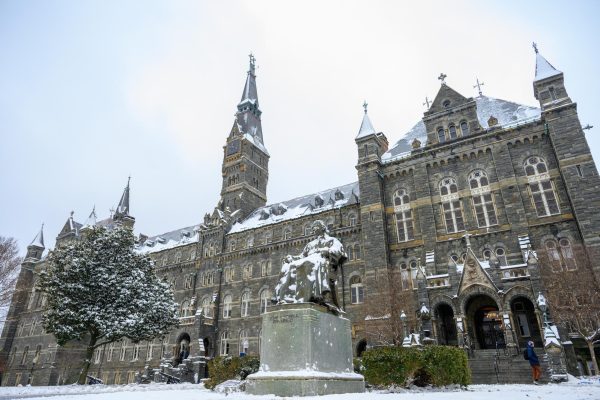An analyst specializing in Palestinian politics warned that enduring peace in Gaza will be impossible without reform, stability and a two-state solution during a webinar Jan. 28.
Ibrahim Dalalsha, director of the Horizon Center, a peace strategy group dedicated to the Israeli-Palestinian conflict, stressed the importance of dialogue, mutual understanding and stability during the event, titled “The Impact of the Ceasefire on Palestinian Politics and Relations with Israel.” The event comes after Israel and Hamas agreed to a preliminary ceasefire which leaves the region’s long-term future uncertain but temporarily ends the conflict, during which Israeli forces have killed over 46,000 Palestinians.
Dalalsha said the current phase of the ceasefire is stable, but added that negotiations for future peace will prove more difficult.
“Regardless of certain violations that could come from either side, I think both sides are committed and will actually continue the first phase,” Dalalsha said during the event. “The problem starts upon the end of it.”
“The second phase is clearly going to be a much more difficult agreement because it entails big decisions like end of war and more difficult decisions that have to be taken politically by the Israel government,” Dalalsha added.

The region has faced ongoing military, social and political conflict for decades, which heightened after the 1948 establishment of the state of Israel displaced 700,000 Palestinians. The current war began when Hamas attacked Israel on Oct. 7, 2023, killing about 1,200 people and taking hundreds of hostages. Israel subsequently invaded Gaza, leaving 90 percent of the population displaced.
Jonathan Lincoln, the director of the Center for Jewish Civilization (CJC), an interdisciplinary program studying Israel and Jewish history, moderated the event. Lincoln said he invited Dalalsha to speak because of Dalalsha’s commitment to building peace through dialogue and negotiation.
“The Horizon Center is keen to promote peaceful resolution of the Palestinian-Israeli conflict and promote transparent and efficient Palestinian government by bridging gaps in understanding and promoting opportunities for direct dialogue between Palestinian and international policymakers, academics and civil society activists,” Lincoln said during the event.
Dalalsha said the conflict delegitimized the Palestinian Authority (PA), a political organization operating in the West Bank under Israeli military occupation, because the group failed to maintain security or secure the release of prisoners from Israel.
“The immediate impact has been rising the level of tensions in the West Bank, to be as accurate to reflecting what is actually happening,” Dalalsha said. “In many ways, in terms of public posturing, I think the PA has been undermined in a very serious way.”
The PA claims jurisdiction over Gaza despite Hamas’s win in a 2006 election, after which Hamas seized complete control of the area and has not held an election since.
Dalalsha said the conflict heightened tensions between the PA and Hamas, undermining Palestinian stability.
“15 months of war in Gaza did not bring those two parties closer,” Dalalsha said. “In fact, it put them even farther in terms of all aspects, including political positions vis à vis conflict with Israel, internal governance issues, power-sharing. There have been no serious attempts to actually create common ground for old factions.”
Dalalsha added that cooperation is essential for stability in Gaza as a whole, which means Hamas must be removed from negotiations and governance.
“You cannot have stable governance in Gaza if you do not have minimal level of understanding between all players,” Dalalsha said. “If I were to introduce principles that could work, regionally and internationally, I would say that they remove Hamas completely from governance — and that is possible. It’s not an impossible mission. I think that the war has broken Hamas’s foundations for governance in Gaza.”
Dalalsha said a two-state solution — in which Palestine would gain internationally recognized independence — would diffuse not only this conflict but future ones.
“A two-state solution is going to be, in my opinion, an end of conflict in so many different aspects, including the fact that Israel would be living in full integration and normalization with people around the region accepting it,” Dalalsha said.
The two-state solution, which has been proposed in numerous peace conferences but never agreed upon, would establish Palestine as an independent state without jeopardizing Israel’s sovereignty. Benjamin Netanyahu, the prime minister of Israel, has expressed hostility toward the two-state solution.
Dalasha said the two-state solution would be difficult, but added that he feels it is the only way to end the cycle of conflict in the region.
“Now, it very much sounds like a dream, but I think frankly, in all realistic ways, if that dream does not start showing signs of life, then I’m very pessimistic that this is going to be a permanent end of war,” Dalalsha said.